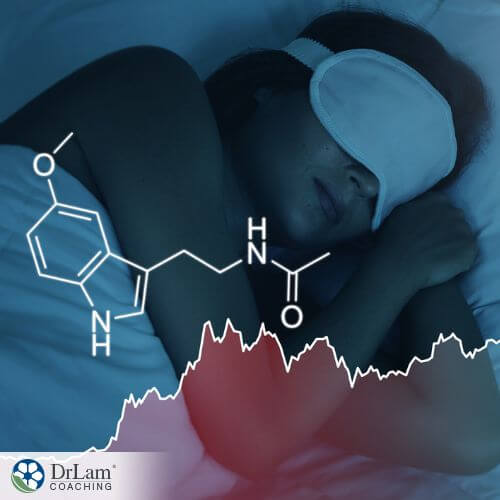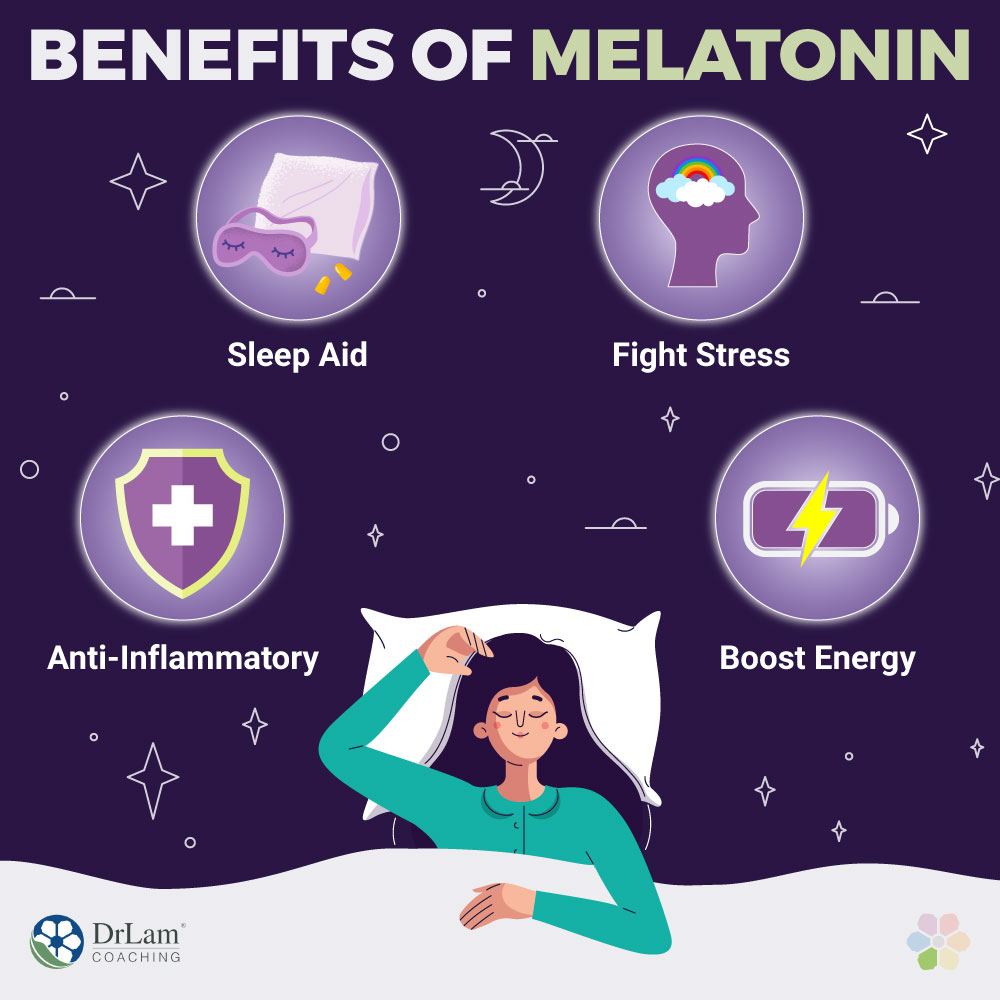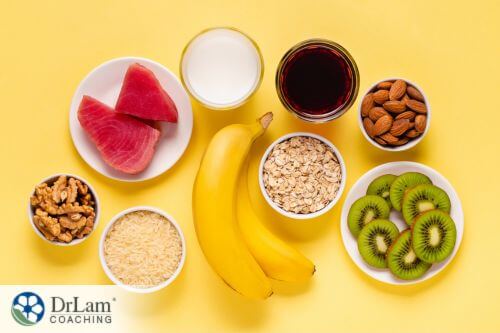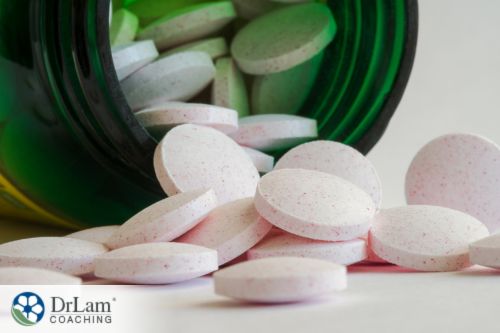 If you have ever tossed and turned in bed struggling to fall asleep, you may have researched natural products to assist with sleep. Melatonin is one of these products.
If you have ever tossed and turned in bed struggling to fall asleep, you may have researched natural products to assist with sleep. Melatonin is one of these products.
Melatonin is a hormone that your body naturally produces. It is made by the pineal gland in your brain. During the daytime, melatonin production is low. However, when it becomes darker, your body releases more. This helps you feel sleepy and ready for bed.
Everyone produces this hormone, but with age, production declines. This can leave some people in need of more melatonin in order to become sleepy. There are several strategies you can use to help with this, including lifestyle changes, diet, and supplements.
One of the most well-known benefits of melatonin is its assistance in sleep production. This hormone works at calming your body and mind, preparing it for sleep. It's primary role in the body is as a chronobiotic. These are compounds that can assist with the circadian rhythm, the natural cycle that your body goes through in 24 hours. This rhythm regulates your cycles of wakefulness and sleepiness by responding to changes in the light. Supplemental melatonin can assist with:
Melatonin is a powerful antioxidant and is more potent than well-known antioxidants such as vitamin E.
In response to stress, illness, and the environment, your body produces free radicals. These are unstable molecules that can cause damage to your cells, increase inflammation, and can increase the risk of complications during illness. Antioxidants help to neutralize these free radicals with one molecule being able to neutralize ten free radicals. This prevents further damage to the body, thus reducing inflammation and tissue damage.
Melatonin is a unique antioxidant as it has both water and fat-soluble properties. This makes it able to travel throughout the body helping to neutralize free radicals.
By neutralizing free radicals, melatonin can prevent and reduce inflammation in the body. With its anti-inflammatory properties, it can help to support various systems of the body including the immune system.
During times of extreme illness, a severe immune response known as a cytokine storm can occur in the body. Cytokines are part of the immune system and can be beneficial to your body. However, too many of them can be harmful and increase the risk of complications and death. Melatonin can reduce this cytokine storm by reducing inflammation.
The mitochondrion is an organelle that is found in every cell of your body. Mitochondria generate most of the energy for the cell, earning its nickname "the powerhouse of the cell."
With its antioxidant abilities, melatonin helps to protect the mitochondria and helps to prevent damage to the mitochondrial membrane. This preserves the health of the mitochondria, preventing damage to it and thus preventing the death of the cell. In turn, this helps to prevent accelerated aging.

 The natural production of melatonin in your body is affected by light and darkness. If there is not enough darkness, the production of melatonin can be reduced. But although there is darkness in the evening, the bright light from electronic devices can inhibit your body's natural melatonin production. To help prevent this from occurring, there are several strategies to try.
The natural production of melatonin in your body is affected by light and darkness. If there is not enough darkness, the production of melatonin can be reduced. But although there is darkness in the evening, the bright light from electronic devices can inhibit your body's natural melatonin production. To help prevent this from occurring, there are several strategies to try.
Research suggests that bright lights suppress the natural production of melatonin. One of the main reasons for this is that these lights emit blue light, specifically, which suppresses melatonin production. If you can, opt for lightbulbs that have a warm light, not a bright light, and if you can dim your lights at nighttime, even better (Gooley et al).
Electronic screens are another culprit of blue light. To avoid this, try to stop using electronic devices an hour before bedtime. If this is not possible, you can try blue light-blocking glasses or switch your devices to night mode.
This may seem counterintuitive, but getting sun during the day helps to regulate your internal clock, thus assisting with the production of melatonin. To best regulate your internal clock, it's important to get sun within 30-45 minutes after waking up.
Another way to regulate melatonin involves modulating cortisol and your stress response. Your body naturally produces cortisol, which works together with melatonin to regulate your sleep-wake cycle. It's production increases as it gets darker. However, when it gets lighter, your body produces cortisol causing you to become more awake and alert. Cortisol production increases until midday, then starts to decline whilst melatonin increases. The drop in cortisol stimulates the production of melatonin and vice versa.
Cortisol is also one of the main stress hormones, and when there is stress, your body will produce higher amounts of cortisol. This increase in cortisol can then inhibit the production of melatonin. This is one of the reasons why stress-related conditions like adrenal fatigue often lead to trouble falling asleep and frequent waking at night.
Practicing relaxation techniques can help to reduce stress and can assist with regulating cortisol levels. Helpful techniques include:
Nutrition can also help to regulate your levels of this key hormone.
Several foods from different food groups contain some amount of melatonin. However, in most cases, there are only small amounts present in each food. These include:
It is also important to be mindful that many different factors will affect the melatonin content of these foods. These include cultivars, growing conditions, germination, harvesting, and processing afterward such as roasting and drying.
With beverages such as alcohol and coffee, there is some contradictory evidence of their effects on melatonin. A cup of coffee does contain melatonin. However, it also contains caffeine which may reduce your body's natural ability to produce it. The effects of caffeine on melatonin were contradictory. Some studies have found that caffeine can increase nighttime melatonin secretion. However, other studies have found that it can decrease nighttime melatonin secretion. Contradictory results have also been found in the use of alcohol. More research is necessary to determine the relationship between coffee, alcohol, and melatonin (Arnao and Hernandez-Ruiz).
Do note that these foods only contain small amounts of melatonin, and to get a physiological dose from these foods, portion sizes would be huge. For example, to get 0.3mg of melatonin you would need 2718 cherries, 857 cups of walnuts, or over 2000 medium-sized strawberries.
 This amino acid is one of the building blocks of protein and is needed by your body. It is also a precursor to the production of melatonin. Tryptophan is converted to 5-HTP, a precursor to the natural anti-depressant serotonin. 5-HTP is then converted into serotonin, and serotonin is converted to melatonin. If there is a lack of tryptophan in your diet, it can cause a reduced production of 5-HTP, resulting in reduced production of melatonin.
This amino acid is one of the building blocks of protein and is needed by your body. It is also a precursor to the production of melatonin. Tryptophan is converted to 5-HTP, a precursor to the natural anti-depressant serotonin. 5-HTP is then converted into serotonin, and serotonin is converted to melatonin. If there is a lack of tryptophan in your diet, it can cause a reduced production of 5-HTP, resulting in reduced production of melatonin.
Consuming foods rich in tryptophan can assist in naturally increasing levels in your body. Foods rich in tryptophan include:
In the conversion of tryptophan to 5-HTP and eventually melatonin, several micronutrients are involved. These include:
This makes it important to ensure that you receive these nutrients in your diet. Studies have also researched whether or not a high intake of these nutrients would result in an increased production of melatonin. One study in children found that pyridoxine supplementation may increase melatonin production. However, this effect was not seen in adults. Other studies focusing on the use of the other nutrients required in the production of melatonin have not found a correlation. More research is necessary (Arnao and Hernandez-Ruiz).
Melatonin supplements have become increasingly popular. This could be because they have a higher dose than foods and research on their benefits is proving positive.
Melatonin can be delivered to your body through several types of administration such as through an IV, injection, or suppository. Only oral melatonin supplements, however, are considered dietary supplements. These can come as tablets, capsules, gummies, chewable form, or in liquid drops.
However, do note that there is a risk of overdosing on gummies, for children in particular, as they generally taste like sweets. There is also a concern about the sugar and flavorings used in these supplements.
The recommended dose supplementation is typically between 0.3 and 5 mg. Up to 10 mg may be safe, but this should be discussed with your healthcare provider. Higher doses may cause an increase in melatonin during the day and have been connected to suppressed body temperature.
In finding the best dose for you, it is typically best to start at 1 mg, taking 30 minutes before bed, and gradually increase the dose each night until you reach the smallest effective amount, up to 5 mg.
The most common side effects experienced are:
Whilst melatonin supplementation can assist in providing relief, there are some contraindications to using it. These include medications to manage blood pressure, diabetes, seizures, and blood clotting. Melatonin supplementation is also not recommended for pregnant or lactating women. Individuals who are operating heavy machinery should not take this supplement before work.
Research has shown that melatonin supplementation does not affect your own production. However, research does suggest that a higher dose can reduce the sensitivity of receptor sites and increase the need for a higher dose. In contrast, research in cancer patients has found that supplementing can help to increase the production of melatonin in the body. Thus, more research is needed.
 It can be tough to choose a good supplement, and many on the market have low-quality ingredients. Melatonin supplements are considered dietary supplements and are not regulated by the FDA, so the quality of ingredients may not be guaranteed. Supplements can either be manufactured from animal, plant, or synthetic sources. From these sources, there is variation. One study found that after analyzing a range of melatonin supplements, the dose of melatonin varied from 17-478% of the label claim and there was variability between batches. As such, you should always research a melatonin brand before choosing it.
It can be tough to choose a good supplement, and many on the market have low-quality ingredients. Melatonin supplements are considered dietary supplements and are not regulated by the FDA, so the quality of ingredients may not be guaranteed. Supplements can either be manufactured from animal, plant, or synthetic sources. From these sources, there is variation. One study found that after analyzing a range of melatonin supplements, the dose of melatonin varied from 17-478% of the label claim and there was variability between batches. As such, you should always research a melatonin brand before choosing it.
Here are some choices for supplements that can assist in your melatonin production. However, before taking a new supplement, always seek guidance from your healthcare provider. This will help ensure that it is safe for you and of good quality.
This supplement consists only of melatonin and is in spray form. One spray of this supplement delivers the recommended dose of 1.5 mg.
This formulation consists of a combination of nutrients to help support sleep. The ingredients include melatonin and nutrients involved in it's production such as niacin, pyridoxine, and magnesium but also include additional ingredients such as GABA, L-theanine, passionflower, lemon balm, and valerian. GABA as well as the additional ingredients bind to GABA receptors in the brain. This results in a calming effect and can help to facilitate sleep. This supplement is in tablet form and the serving size is one tablet before going to bed.
For some individuals staying asleep can be a challenge and this formulation can assist in maintaining sleep. Like Adrenal Sleep, it is in tablet form and the recommended serving size is one tablet. The combination of ingredients is similar to Adrenal Sleep. However, there are a few additional ingredients. These ingredients are chromium and taurine. Chromium is a trace element, whilst taurine is an amino acid. Research has found that these compounds can assist with improving sleep.
Adrenal Fatigue Syndrome (AFS) is a condition that some individuals experience in response to chronic stress. Your body can handle short-term stress through the adrenal glands and the NeuroEndoMetabolic (NEM) Stress Response System. When you experience stress, your adrenal glands, release stress hormones including cortisol. This helps your body to handle the stress.
When stress becomes long-term, however, your adrenal glands can become depleted, and this can result in imbalances within the NEM system. This results in AFS. There are six interconnected sets of related organ systems in the NEM, and the symptoms that you will experience will depend on where the imbalance is occurring.
One of these circuits is the neuroaffect circuit. It consists of the brain, the autonomic nervous system, and the gut microbiome. This system helps to regulate your mental and emotional health. When there is an imbalance within this circuit, you may experience symptoms such as anxiety, depression, and challenges falling asleep and staying asleep.
 Supplementing can help to provide relief from these symptoms. However, there are cautions to be aware of. Your body can become very sensitive during AFS and can react unexpectedly to new supplements. This may set you back in your healing journey.
Supplementing can help to provide relief from these symptoms. However, there are cautions to be aware of. Your body can become very sensitive during AFS and can react unexpectedly to new supplements. This may set you back in your healing journey.
This makes it important that if you would like to use a melatonin supplement for relief, chat with your healthcare provider first. If you are cleared to start supplementing, ask your healthcare professional for guidance in choosing a brand from a reputable company.
Melatonin is a hormone that your body naturally produces and plays a role in:
Lifestyle and nutrition changes can assist with increasing melatonin in the body. Many people also choose to use melatonin supplements, although it is important to choose a reputable brand. Before starting this supplement, however, it is important to get guidance from your healthcare provider.
If you are currently having a hard time getting a peaceful night's rest, and are confused about your options, the Dr. Lam team can assist. You can call us at +1 (626) 571-1234 or click here for a free initial call.

Try Melamax for some well-deserved rest!
Arnao MB and Hernandez-Ruiz J. "The Potential of Phytomelatonin as a Nutraceutical" Molecules, vol. 23, no. 1, Jan. 2018 https://www.ncbi.nlm.nih.gov/pmc/articles/PMC6017233/
Gooley, JJ et al. "Exposure to Room Light Before Bedtime Suppresses Melatonin Onset and Shortens Melatonin Duration in Humans" J Clin Endocrinol Metab, vol. 96, no. 3, Mar. 2011, pp. 463-72. https://www.ncbi.nlm.nih.gov/pmc/articles/PMC3047226/
Savage R et al. "Melatonin" Statpearls, Aug. 2022 https://www.ncbi.nlm.nih.gov/books/NBK534823/
Melatonin supplements generally begin to make you feel sleepy within 30 minutes to 2 hours after taking it. If you are using it to get to sleep regularly, 30-45 minutes before bed may be the best time to take it. However, if you are using it to move your sleep schedule to an earlier time or to deal with jetlag, 2 hours could be the best time frame to allow your body time to feel sleepy at an earlier time.